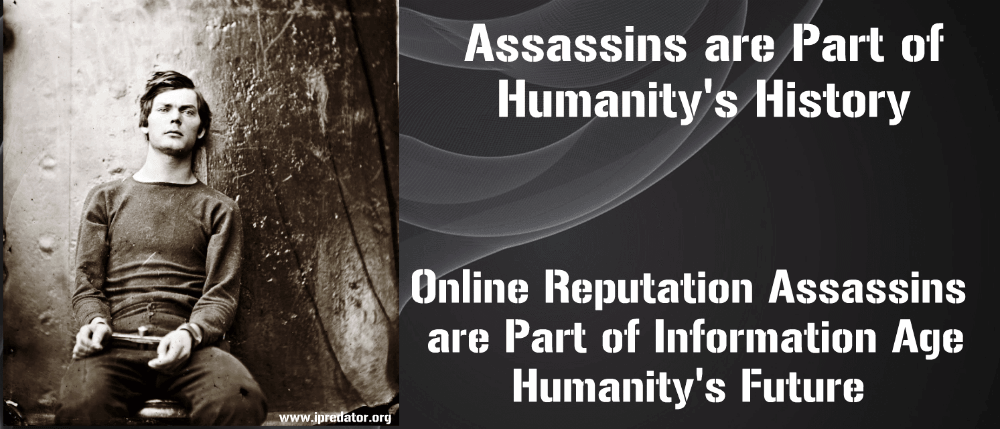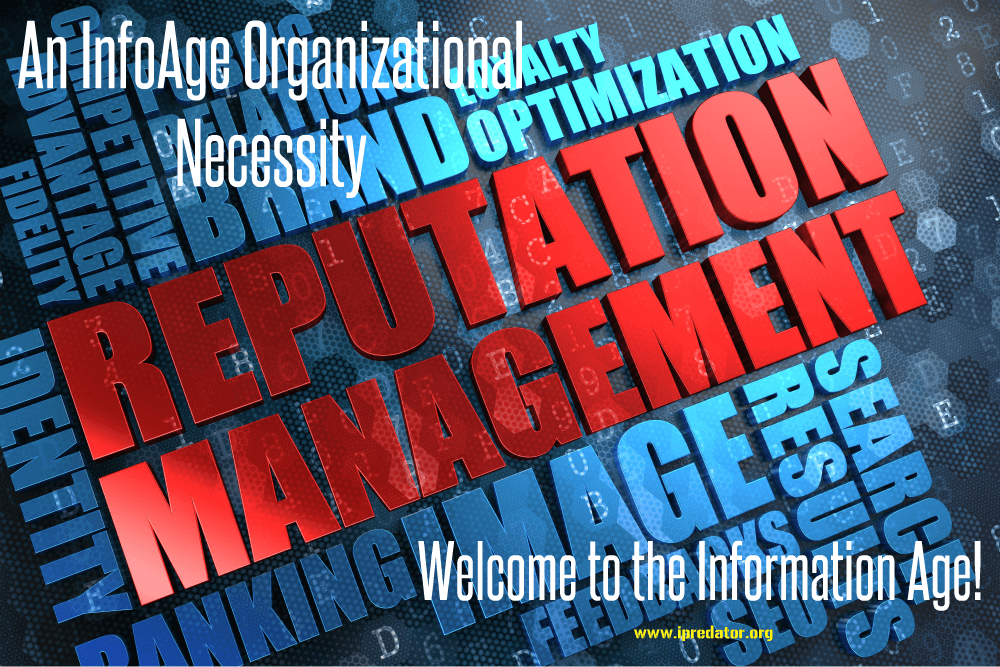
Online Reputation Management
&
Online Character Assassins
Online Reputation is a term used to describe the reputation of an ICT user or business that is disseminated online and available to peers, superiors, loved ones and consumers. This information can be positive or negative and vital to the health, success and reputation of an ICT user or business. Digital Reputation is created and sustained by peers, school or work associates, loved ones, acquaintances, consumers, competitors, adversaries, online strangers and iPredators. Given the widespread growth and expansion of ICT, a positive online reputation is vital to people, communities and businesses to thrive, survive and for attainment of personal and/or corporate endeavors.
Online Reputation and the growing risks confronting ICT users and businesses have become increasingly endemic due to the escalating use and significance of the Internet as a communication platform. With the ascent of social media, the formation of Online Reputation is an increasingly common process and the practices of Online Reputation Management have become crucial for both people and corporate entities. An ICT user or business’s Online Reputation is directly correlated to their Digital Footprint. Like Digital Footprint, an ICT user’s Online Reputation is directly correlated to the quantity, quality, accuracy and extent of personal information they post or share online available and used by other ICT users.
Online Reputation Management [ORM]
The Information Age is a societal model and period beginning in the last quarter of the 20th century and presently thriving in the second decade of the 21st century. The Information Age represents the evolution, emergence, consumption of and reliance upon Information and Communications Technology (ICT). In a mere four decades, ICT and its importance to humanity have led many to surmise that the planet and its human inhabitants are amidst an Information Revolution.
Mobile digital technology, telecommunications, social media & online reputation are just a few examples of humanities newest frontiers. In these arenas, they deal with the new frontier of how humankind obtains exchanges and disseminates information.
As humanity is at the beginning of the Information Age and with no way to forecast its longevity, this new frontier of communication is also when historians will say Information and Communications Technology (ICT) had its origin. In addition to this new technological explosion, society has become entrenched with the age-old phenomenon of reputation. As per Merriam-Webster, an Encyclopedia Britannica Company, “Reputation” is A. An overall quality or character as seen or judged by people in general, B. A recognition by other people of some characteristic or ability and C. A place in public esteem or regard or good name.
Without going into the social psychological underpinnings of Alfred Adler on why humans seek a positive reputation, the reality is that the Information Age terms of Online Reputation, Digital Footprint, Internet Defamation & Online Reputation Management are new to humanities lexicon and have become vital to success. For the first time in human civilization’s history and for all children, adults and forms of business, the old fashion term of Reputation has become digitized and now called, Digital Reputation or Online Reputation.
Prior to the Information Age, a person or organization’s reputation was defined by their character, demanding work and their contributions to the community. People & businesses could make mistakes, wrong decisions and poor choices and still repair their reputation. Fixing and enhancing a compromised reputation was possible, provided they admitted their wrong doings & failings, changed their behavioral trajectory, and illustrated to their loved ones and the community that they have changed. This process has become non-existent in the Information Age.
As a huge supporter of technological advancements and appreciative of ICT, this writer acknowledges that all existence is a double-edged sword sharing both positive and negative. ICT and cyberspace are no different from anything else in our macrocosm. As stated above, the elegance of ICT is the ability to rapidly obtain exchange and disseminate information. In relationship to digital reputation, when rooted in negativity, malevolence, retribution & criminality, a person or organization’s online reputation and capacity to thrive can be destroyed.
Not only can a negative online reputation cause embarrassment & humiliation; it can cost people their job, future employment, college admissions and a cornucopia of other sought-after developmental steps all humankind seeks.
If a business does not allocate a portion of their operating budget to online reputation management, they can suffer tremendous devastation from disgruntled consumers and employees, nefarious competitors and ex-partners (intimate & corporate) seeking retribution. The proverbial poison or negative side of the double-edged sword is that often, the negative and disparaging information disseminated in cyberspace is felonious, embellished and designed using “partial truths”.

The old marketing and public relations adage of “All news is good news” does not apply in the Information Age. The new adage should be “Anything other than great news is bad news.” The ethical considerations involving digital reputation, digital reputation management, online reputation management and unethical reputation management are many. From an unethical and criminal standpoint, there are a growing segment of professionals and companies that are designed and managed by iPredators and cybercriminals. Existing in every community throughout history are people driven by greed.
It is no different today as greed is a primary force within the criminal mind. A simple equation is Greed + Criminal Mind + ICT Savvy = iPredator. Like all criminals, iPredators rely upon fear, vulnerability, ignorance & discouragement in their targets to increase their probability of succeeding in their nefarious plans. Given there are millions of people and businesses who don’t care or monitor their online reputation, the pool of potential targets is enormous.
Greed + Criminal Mind + ICT Savvy = iPredator
Although this writer does not have clinical data or hard proof of his prediction, he feels confident that creative cyber criminals and rage driven online users will one day verify his prognostication. If not already in action, there will be online reputation management companies, small businesses and solo professionals who will use iPredator tactics to victimize vulnerable consumers for financial gain. Among the plethora of potential iPredator tactics, an example of just one is as follows:
The criminal mind with ICT savvy offer consumers a free reputation search at their website, retains their basic demographic information and then uses their ICT prowess to create and disseminate disparaging information indirectly manipulating that person or business to become a paying consumer of their online reputation management services.
They take the fear-based consumer who uses their free reputation search and makes them a paying consumer of their services because they have recently found negative information about themselves online. What the consumer, now victim, does not know is the ethical online reputation management service was the entity who planted that information. Without sounding facetious, the elegance of the cybercriminal mind, blessed with ICT savvy, is both sinister and elegant.
The world of Online Reputation Management is a multi-billion industry and assuredly growing along ICT’s progress. Given there are no laws or “Internet Police” protecting citizens in cyberspace, iPredators have the free reign to victimize online users without fear of identification or punishment. Provided for the reader is a brief overview of the basic typologies of people in the Information Age and learning the complex nature of digital reputation and those who engage in nefarious and malevolent activities using ICT.

Regarding Online Reputation & iPredators using Online Reputation Management services as their cloak, their identities are not hidden, but cloaked by a legal and growing industry. The tactics they use as the entities inserting disparaging information about consumers to increase their probability of becoming paying consumers is rooted in cyber deception.
Reputation Management Protection
The solutions and recommendations for preventing someone or their business from becoming a victim of negative information being entered into cyberspace are multi-faceted and extensive. Digital Citizenship can be summed up by an analogy this writer’s mother use to say to him during his childhood but applied to information disclosed and published in cyberspace. God rest her soul and she would say, “If you don’t have something nice to say about others, don’t say anything at all.” Applied to the Information Age, do not disseminate or exchange negative information about others unless it is rooted in verifiable evidence, not motivated by anger or vengeance and serves a moral purpose of helping and/or forewarning others.
The amount, breath and extent of personal information an ICT user or organization disseminates into cyberspace are directly correlated to their risk of suffering an assault to their online reputation. Disclosing minimal personal information online does not completely insulate an ICT user or business from an online reputation assault, but a significant factor in the online reputation management.

Michael Nuccitelli, Psy.D.
Michael Nuccitelli, Psy.D. is a NYS licensed psychologist, cyberpsychology researcher and online safety educator. In 2009, Dr. Nuccitelli finalized his dark side of cyberspace concept called iPredator. Since 2010, he has advised those seeking information about cyberbullying, cyberstalking, cybercriminal minds, internet addiction and his Dark Psychology concept. By day Dr. Nuccitelli is a practicing psychologist, clinical supervisor and owner of MN Psychological Services, PLLC. After work and on the weekends, he volunteers helping online users who have been cyber-attacked. Dr. Nuccitelli’s is always available to interested parties and the media at no cost. This website and everything created by Dr. Nuccitelli is educational, free and public domain.
